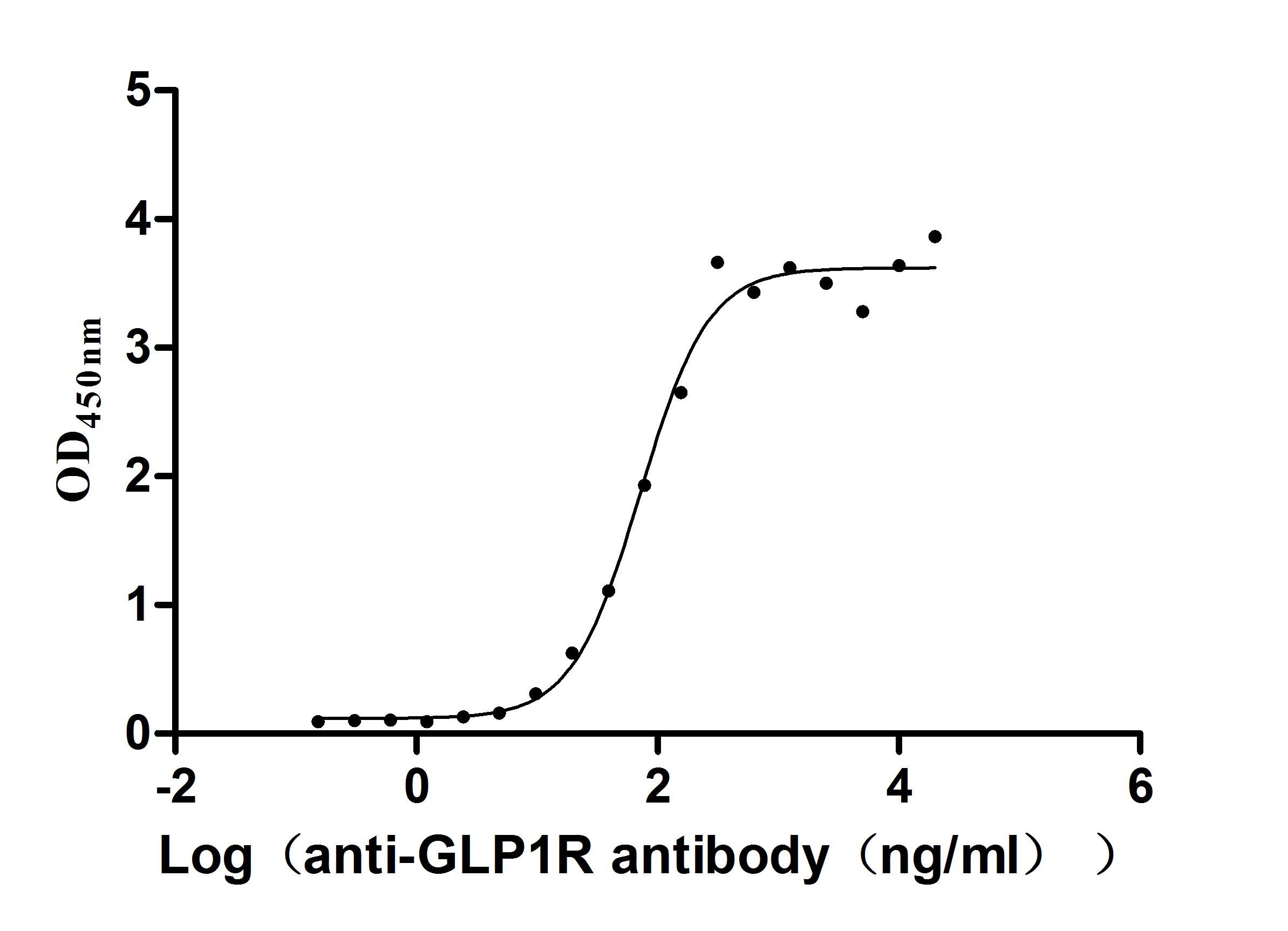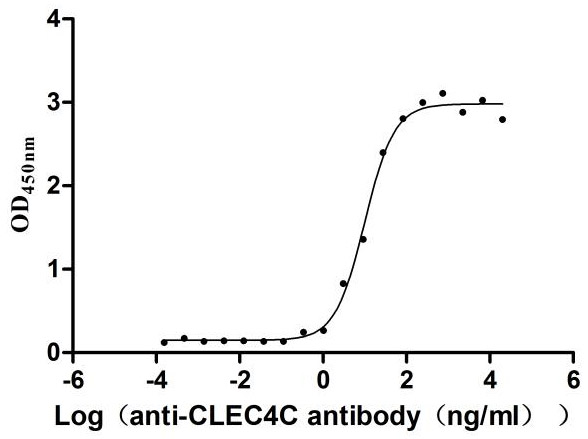Recombinant Mouse Mitogen-activated protein kinase kinase kinase 14 (Map3k14), partial
-
中文名称:小鼠Map3k14重组蛋白
-
货号:CSB-YP013422MO
-
规格:
-
来源:Yeast
-
其他:
-
中文名称:小鼠Map3k14重组蛋白
-
货号:CSB-EP013422MO
-
规格:
-
来源:E.coli
-
其他:
-
中文名称:小鼠Map3k14重组蛋白
-
货号:CSB-EP013422MO-B
-
规格:
-
来源:E.coli
-
共轭:Avi-tag Biotinylated
E. coli biotin ligase (BirA) is highly specific in covalently attaching biotin to the 15 amino acid AviTag peptide. This recombinant protein was biotinylated in vivo by AviTag-BirA technology, which method is BriA catalyzes amide linkage between the biotin and the specific lysine of the AviTag.
-
其他:
-
中文名称:小鼠Map3k14重组蛋白
-
货号:CSB-BP013422MO
-
规格:
-
来源:Baculovirus
-
其他:
-
中文名称:小鼠Map3k14重组蛋白
-
货号:CSB-MP013422MO
-
规格:
-
来源:Mammalian cell
-
其他:
产品详情
-
纯度:>85% (SDS-PAGE)
-
基因名:
-
Uniprot No.:
-
别名:Map3k14; NikMitogen-activated protein kinase kinase kinase 14; EC 2.7.11.25; NF-kappa-beta-inducing kinase; Serine/threonine-protein kinase NIK
-
种属:Mus musculus (Mouse)
-
蛋白长度:Partial
-
蛋白标签:Tag type will be determined during the manufacturing process.
The tag type will be determined during production process. If you have specified tag type, please tell us and we will develop the specified tag preferentially. -
产品提供形式:Lyophilized powder
Note: We will preferentially ship the format that we have in stock, however, if you have any special requirement for the format, please remark your requirement when placing the order, we will prepare according to your demand. -
复溶:We recommend that this vial be briefly centrifuged prior to opening to bring the contents to the bottom. Please reconstitute protein in deionized sterile water to a concentration of 0.1-1.0 mg/mL.We recommend to add 5-50% of glycerol (final concentration) and aliquot for long-term storage at -20℃/-80℃. Our default final concentration of glycerol is 50%. Customers could use it as reference.
-
储存条件:Store at -20°C/-80°C upon receipt, aliquoting is necessary for mutiple use. Avoid repeated freeze-thaw cycles.
-
保质期:The shelf life is related to many factors, storage state, buffer ingredients, storage temperature and the stability of the protein itself.
Generally, the shelf life of liquid form is 6 months at -20°C/-80°C. The shelf life of lyophilized form is 12 months at -20°C/-80°C. -
货期:Delivery time may differ from different purchasing way or location, please kindly consult your local distributors for specific delivery time.Note: All of our proteins are default shipped with normal blue ice packs, if you request to ship with dry ice, please communicate with us in advance and extra fees will be charged.
-
注意事项:Repeated freezing and thawing is not recommended. Store working aliquots at 4°C for up to one week.
-
Datasheet :Please contact us to get it.
靶点详情
-
功能:Lymphotoxin beta-activated kinase which seems to be exclusively involved in the activation of NF-kappa-B and its transcriptional activity. Promotes proteolytic processing of NFKB2/P100, which leads to activation of NF-kappa-B via the non-canonical pathway. Could act in a receptor-selective manner.
-
基因功能参考文献:
- Pathological activation of hepatic NIK likely blocks hepatocyte replication, contributing to liver disease progression. PMID: 30070632
- Nik(-/-) mice could be useful as a spontaneous model of specific features of Eosinophilic esophagitis. PMID: 29259025
- global or thymus-specific ablation of the NIK gene results in fatal autoimmune liver disease in mice. PMID: 28267623
- These findings highlight the importance of NIK in tumor pathogenesis and invite new therapeutic strategies that attenuate mitochondrial dysfunction through inhibition of NIK and Drp1. PMID: 27889261
- constitutive activation of NIK in the hematopoietic system leads to bone marrow (BM) failure and postnatal lethality. PMID: 27733012
- results suggest that changes in the relative concentrations of RelB, NIK:IKK1, and p100 during noncanonical signaling modulate this transitional complex and are critical for maintaining the fine balance between the processing and protection of p100. PMID: 27678221
- NIK pathways in both hepatocytes and immune cells act in concert to promote liver steatosis and glucose production in the setting of obesity. PMID: 28379340
- this study demonstrates that although NIK is dispensable for thymocyte development, it has a cell-intrinsic role in regulating the homeostasis and function of peripheral T cells PMID: 26912039
- Using a novel conditional mutant of NIK, the authors could show in vivo that NIK signaling in thymic epithelial cells is essential for the thymic hardwiring of gammadelta T cell cytokine production. PMID: 26637788
- NIK not only contributes to lymphoid organogenesis, inflammation and cell survival but also to TNFR1/RIP1-dependent cell death independently of the alternative NF-kappaB pathway. PMID: 26045047
- This study demonstrated that NFkappaB-inducing kinase inhibits NFkappaB activity specifically in neurons of the CNS. PMID: 26778773
- results assign NIK-induced alternative NF-kappaB signaling a master regulatory role in B-cells, starting from the T1 stage and also show that B-1 B cells are less dependent on this pathway, presumably owing to the existence of alternative pathways yet to be determined PMID: 26593098
- Deletion of NIK in adult mice results in decreases in B cell populations in lymph nodes and spleen, similar to what is observed upon blockade of BAFF. PMID: 26116508
- We identify NIK as a critical negative regulator of beta cell function, as pharmacological NIK activation results in impaired glucose-stimulated insulin secretion in mouse and human islets. PMID: 26122662
- the NIK in thymic stroma may be critically involved in the differentiation of most NKT cell subsets (although the level of NIK dependence may vary among the subsets), and also the NIK in NKT-alphabeta cells may be dispensable for their effector function. PMID: 25988531
- CHIP/TRAF3/NIK interactions recruit NIK to E3 ligase complexes for ubiquitination and degradation, thus maintaining NIK at low levels PMID: 25792747
- The results suggest a pivotal role of NIK in the thymic stroma in establishing self-tolerance by orchestrating cross-talk between medullary thymic epithelial cells and dendritic cells as well as thymocytes. PMID: 25261487
- These studies provide evidence for a role of NF-kappaB-inducing kinase (NIK) and subsequent non-canonical NF-kappaB signalling in pathological angiogenesis PMID: 25043127
- Our results therefore establish that the negative feedback control of IKKalpha-mediated NIK turnover occurs via a novel proteasome-dependent and cIAP-independent mechanism. PMID: 24942881
- The role of Peyer's patches and/or mesenteric lymph nodes in bacterial translocation was evaluated in mice deficient for both due to a mutation of NF-kappa B-inducing kinase. PMID: 24745143
- Results show that nuclear factor-kappa B inducing kinase has a role in graft-versus-host disease by maintaining the viability of activated alloreactive T lymphocytes. PMID: 20823135
- NIK could be involved in thymic positive selection of some alphabeta T cells and that NIK in non-haematopoietic cells is important for the optimal development and/or maintenance of gammadelta T cells. PMID: 24117043
- These results demonstrate a cell-intrinsic requirement for NIK in the generation and/or maintenance of memory T cells in response to acute viral infection. PMID: 24006459
- IKKalpha and its activator, NF-kappaB-inducing kinase (NIK), support the expansion of tumor-initiating cells. PMID: 23602409
- ATP consumption and peptide phosphorylation assays confirm that phosphorylation of NIK does not increase enzymatic activity. PMID: 22921830
- overactivation of liver NIK in obesity promotes hyperglycemia and glucose intolerance by increasing the hyperglycemic response to glucagon and other factors that activate CREB. PMID: 22581287
- Results suggest a possible role of NIK in the liver and renal tissues of insulin-resistant mice. PMID: 22340218
- NIK activity in nonhematopoietic cells controls Th2 cell development and prevents eosinophil-driven inflammatory disease, most likely using a signaling pathway that operates independent of the known NIK substrate IKKalpha. PMID: 22474019
- NIK was not needed for antigen receptor signaling. It was required for costimulation via OX40. Conditional overexpression of NIK in T cells caused rapid, fatal autoimmunity with hyperactive effector T cells & poorly suppressive Foxp3(+) Tregs. PMID: 22045568
- Cigarette smoke and TNFalpha increase NIK levels causing phosphorylation of IKKalpha, which leads to histone acetylation. PMID: 21887257
- a population of thymic DCs requires NIK to shape the formation of most alphabeta CD4(+) T effector lineages during early development. PMID: 21807870
- Data show that OC-specific NIK lacking its TRAF3 binding domain (NT3) transgenic mice have an exaggerated osteolytic response to arthritis. PMID: 21151480
- Lipopolysaccharide induces activation of both canonical and non-canonical pathways of NF-kappaB and the non-canonical pathway requires phosphorylations of BCL10 (serine 138) and NIK. PMID: 20466000
- NIK overexpression amplifies, whereas ablation of its TRAF3-binding domain replaces BAFF:BAFF-R-mediated survival signals in B cells. PMID: 18663224
- A role is established for NIK in Nod2-dependent signaling. PMID: 16552041
- the degradation of NIK occurs upon assembly of a regulatory complex through TRAF3 recruitment of NIK and TRAF2 recruitment of cIAP1 and cIAP2 PMID: 18997794
- These findings indicate an upstream signaling role for BCL10, in addition to its effects on IKKgamma, the regulatory component of the IKK signalosome, and a requirement for BCL10 in both canonical and noncanonical pathways of NF-kappaB activation. PMID: 19897484
- results suggest critical roles for NIK in setting the threshold for T cell activation, and partly account for the immunodeficiency in aly mice. PMID: 12133934
- Results show that NF-kappa B-inducing kinase is necessary for RelB activation upon triggering of surface receptors. PMID: 12810685
- NIK plays an essential role in the organization of the thymic microenvironment that is required for the establishment of self-tolerance. PMID: 14764671
- Nuclear factor-inducing kinase plays a role in osteopontin-induced MAPK/IkappaBalpha kinase-dependent nuclear factor kappaB-mediated promatrix metalloproteinase-9 activation PMID: 15247285
- While Nik-/- mice had inflammation equivalent to that of Nik+/+ controls, they showed significantly less periarticular osteoclastogenesis and less bone erosion. PMID: 15937549
- NIK plays a pivotal role in controlling the development and expansion of CD4+CD25+ regulatory T (Treg) cells. PMID: 16034105
- a novel role for NIK as a histone H3 modifierin in the endotoxin response through modification of nucleosomal structure. PMID: 16675465
- NIK acts as crucial regulator in MMP-9 activation thereby controlling melanoma cell motility and chemoinvasion PMID: 16691505
- deregulation of the canonical NF-kappaB pathway in TRAF3-deficient cells results from accumulation of NF-kappaB-inducing kinase PMID: 18292232
- NIK in stromal cells has a specific role in the regulation of S1P-mediated trafficking of peritoneal B ce PMID: 18292290
- The absence of functional NIK impairs primary HTLV-1 proliferation and abolishes the maintenance of provirus. PMID: 18312467
- Deletion of p100 restores the capacity of NIK-deficient osteoclast (OC) precursors to differentiate and normalizes RelB and p65 signaling. PMID: 18322009
- NIK mediates synergistic activation of STAT3 by T-cell receptor and IL-6 receptor signals.NIK as an important signaling factor that regulates Th17 differentiation and experimental autoimmune encephalitis induction. PMID: 19411637
收起更多
-
亚细胞定位:Cytoplasm.
-
蛋白家族:Protein kinase superfamily, STE Ser/Thr protein kinase family, MAP kinase kinase kinase subfamily
-
数据库链接:



















